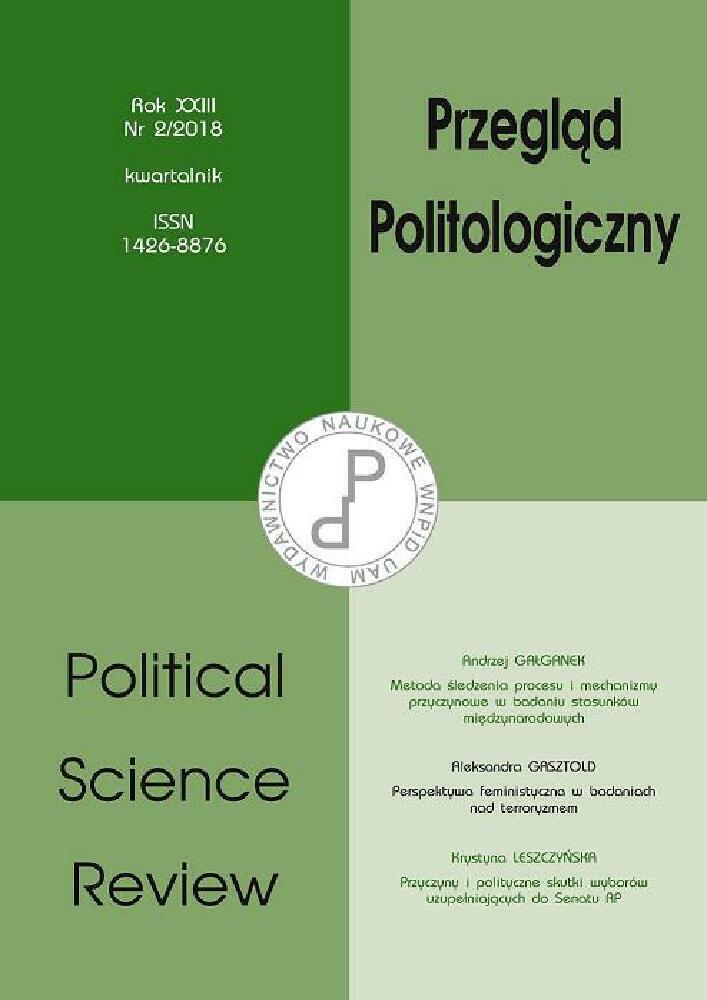Abstract
This article analyzes the most important challenges facing the state in terms of safety culture. The paper also discusses the relationship between political and security cultures. Yet the main subject of the article is the importance of cybersecurity, the definition of which refers not only to the dimension of technology, but also to specific ideas, norms and principles that shape the existence of contemporary man and allow him to function in virtual reality. The popularity of this topic results mainly from the dynamically developing IT technology, but also from the expansive nature of cyberspace, where most social phenomena are already occurring. Therefore, the paper analyzes the concept of cybersecurity culture on the basis of a comparison of the existing definitions of both political and security cultures. Another important issue in this context is education, which is a tool for promoting certain principles and values, among other things. It should be noted, however, that in terms of both politics and security the cultural sphere is an extremely complex and multidimensional process, and that the two areas often overlap. Thus, without understanding the importance of culture, it is not possible to effectively address modern challenges to security policy.
References
Allcott H., Gentzkow M. (2017), Social Media and Fake News in the 2016 Election, „Journal of Economic Perspectives”, vol. 31, nr 2.
Almond G., Verba S. (1963), The Civic Culture – Political Attitudes and Democracy in Five Nations, Nowy Jork.
Barber R. (2007), Dżihad kontra McŚwiat, Warszawa.
Barker Ch. (2004), The SAGE Dictionary of Cultural Studies, Londyn.
Chojnowski L. (2016), Bezpieczeństwo narodowe. Studium Teoretyczne, Słupsk.
Culture and Security (1999), red. K. R. Krause, Londyn.
Culture of National Security (1996), red. P. J. Katzenstein, Nowy Jork.
Garlicki J. (1991), Kultura polityczna młodzieży studenckiej, Warszawa.
Garlicki J., Noga-Bogomilski A. (2004), Kultura polityczna w społeczeństwie demokratycznym, Warszawa.
Garlicki J. (2010), Socjologiczny wymiar studiów europejskich, w: Studia europejskie. Zagadnienia metodologiczne, red. K. A. Wojtaszczyk, W. Jakubowski, Warszawa.
Gnesotto N. (2000), For a common European security culture, http://www.iss.europa.eu/publications/detail/article/for-a-common-european-security-culture, 12.05.2017.
Harrel Y. (2015), Rosyjska cyberstrategia, Warszawa.
Hofstede G. (2010), Cultures and Organizations, Nowy Jork.
Hofstede G. (2013), Culture’s Consequences: Comparing Values, Behaviors, Institutions and Organizations Across Nations, Londyn.
Howorth J. (2007), Security and Defence in the European Union, Palgrave Macmillan.
Jabłoński W. (1998), Kultura polityczna i jej przemiany, w: Studia z teorii polityki, red. A. W. Jabłoński, L. Sobkowiak, Wrocław.
Leksykon politologii (1999), red. A. Antoszewski, R. Herbut, Wrocław.
Pastae V. (2015), Considerations on the relation between values and security culture, „Strategic Impact”, vol. 54.
Plotkin H. (1996), Some psychological mechanisms of culture, „Philosophica”, vol. 57, nr 1.
Pokruszyński G. (2003), Interwencje militarne w politykach bezpieczeństwa, Warszawa.
Schein E. H. (2004), Organizational Culture and Leadership, San Francisco.
Schlienger T., Teufel S. (2003), Information security culture – From analysis to change, „South African Computer Journal”, vol. 31.
Siponen M. T. (2000), A Conceptual Foundation for Organizational Information Security Awareness, „Information Management & Computer Security”, vol. 8, nr 1.
Słownik polityki (1999), red. M. Bankowicz, Warszawa.
Słownik terminów z zakresu bezpieczeństwa narodowego (2009), Warszawa.
Stanton J. M., Stam K. R., Mastrangelo P., Jolton J. (2005), Analysis of End User Security Behaviors, „Computers & Security”, vol. 24.
Vlassis A. (2016), Soft power, global governance of cultural industries and rising powers: the case of China, „International Journal of Cultural Policy”, vol. 22, nr 4.
Vroom C., von Solms R. (2004), Towards information security behavioural compliance, „Computer and Security”, vol. 23.
Weisband E., Thomas C. I. P. (2016), Political Culture and the Making of Modern Nation-States, Londyn–Nowy Jork.
Wolfers A. (1952), „National Security” as an Ambiguous Symbol, „Political Science Quarterly”, vol. 67, nr 4.
Zalewski S. (2013), Polityka a strategia bezpieczeństwa, w: Strategia Bezpieczeństwa Narodowego Polski, red. J. Gryz, Warszawa.
Zięba R. (1987), Leksykon pokoju, Warszawa.

